Winter solstice celebrated at historic sites celebrated
PA Media
Special access is allowed to the ancient Stonehenge monument during the solstice

The winter solstice sunrise was greeted by thousands of people at Stonehenge, with a focus on "renewal, rebirth and good vibes".
The ancient site opened its Monument Field at 07:45 GMT so crowds could see the sun break over the iconic stones.
Despite a windy Wiltshire morning, people followed the "spiritual draw of the area" to mark the winter solstice, which is the shortest day of the year.
From now on, the nights will slowly start to draw back again and the days will gradually become longer.
EPA
Hundreds of people came to the stones to mark the occasion
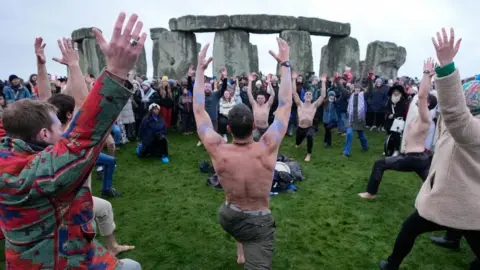
The sun rose at Stonehenge at approximately 08:09 to cheers and applause.
It is due to set at 16:02, meaning there will be little under eight hours of daylight.
Civil servant Chris Smith, 31, had come to Stonehenge for the first time.
"This is all about renewal, rebirth, we're entering into the new year, and it's also a good time to acknowledge what's taking place in the year that's been," he said.
"For me, I've gone through a bit of a tumultuous year, there's been lots that has taken place for me in the past 24 months, and this is an opportunity to consolidate everything that has taken place this year and bury that in the past and be able to move forward then into this next new year.
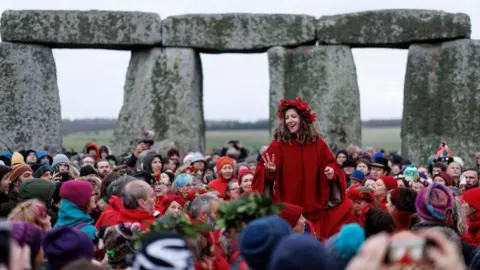
"There's such a vibe. I mean, if you look around, you've got everybody here, there's such an energy in the space.
"You can really feel it, like it's all good vibes. People are just here enjoying themselves, and that's kind of one of the draws of these sorts of events.
"We have got people here from all walks of life. This is the community. And I think in today's age, this is a really important thing to do."
EPA
Stonehenge won't see crowds like this again until June 21 2025
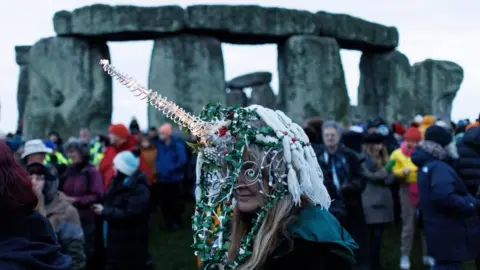
The stones, which are thought to have been placed there around 2,500 BC, line up with the Sun's movements during the two solstices, marking the changing of the seasons.
Usually, access for large crowds of people is prohibited, but English Heritage opens up the site for the summer and winter solstices.
Stonehenge solstice: 'People here are committed'
English Heritage's Stonehenge director Steve Bax said: "It was fantastic to welcome around 4,500 people to Stonehenge this morning to celebrate winter solstice, and we were delighted that more than 100,000 people also watched live online from around the world.
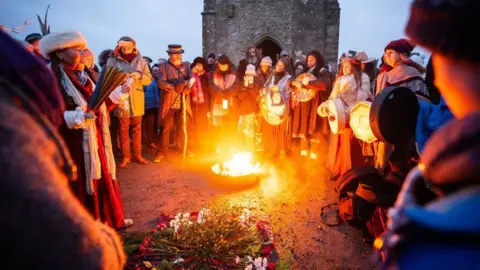
"It was an enjoyable and peaceful celebration despite the sun not making an appearance and it was great to see so many families enjoying themselves around the monument."
Timelapse: Watch as crowds gather at Stonehenge to mark the winter solstice
In nearby Avebury, which is home to another ancient stone circle, two men wearing cloaks could be seen blowing horns as people gathered to watch the sunrise over the fields.
Near the stone circle there is a group of beech trees which people tie ribbons to.
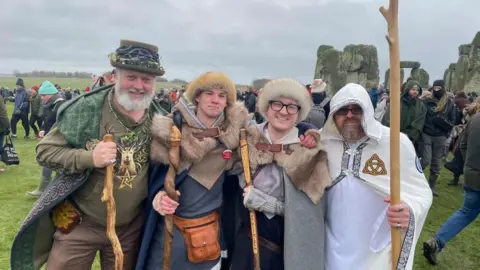
This is a pagan tradition known as "wishing trees", done as prayers to the tree spirits or in the memory of loved ones.
PA Media
Glastonbury Tor also saw celebrations this morning
In Somerset, Glastonbury Tor also saw crowds of people climbing the hill earlier this morning to mark the sun rising.
The Tor is part of the ruins of the 15th Century St Michael's Church, and rises 518ft (158m) above the Somerset Levels to give a panoramic view of Wells, the Bristol Channel, Wiltshire, the Polden Hills and Exmoor.
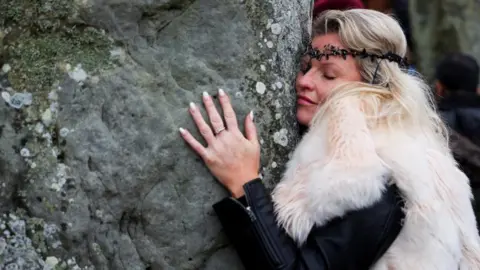
It is regarded by some as a spiritual site just like Stonehenge.
At the top of the hill, a fire was lit and songs were sung by people gathered there.
Stonehenge has strong associations for people with spiritual beliefs
Reuters
Access to the stones is usually restricted by English Heritage









































